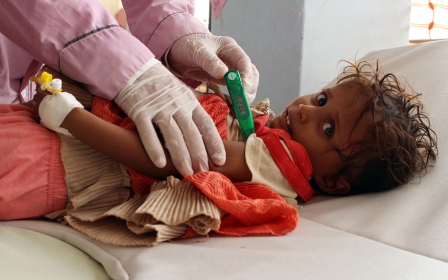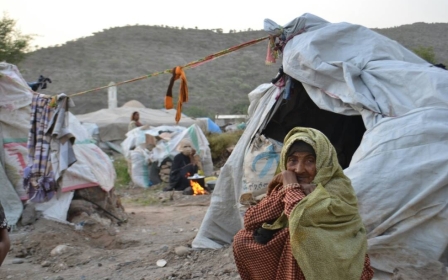Yemeni children suffer in their millions as war rages, says UN
A vicious combination of war, cholera and hunger has left 80 percent of Yemeni children in desperate need of aid, the UN said on Wednesday.
"Nearly 80 percent of Yemen's children need immediate humanitarian assistance," the executive directors of three UN agencies said in a joint statement released at the end of a two-day visit.
"Nearly two million Yemeni children are acutely malnourished. Malnutrition makes them more susceptible to cholera. Disease creates more malnutrition.
"A vicious combination."
More than two years of fighting between Yemen's Saudi-backed government and Shia rebels allied with Iran have destroyed much of the country's infrastructure and left millions at risk of famine.
The country also faces "the world's worst cholera outbreak in the midst of the world's largest humanitarian crisis", with the number of cases expected to reach 600,000 by the end of the year, the agency directors said.
The directors of the World Health Organisation, the UN Children's Fund and the World Food Programme toured both government- and rebel-held areas during their visit.
They said they saw "children who can barely gather the strength to breathe" and vital infrastructure damaged or destroyed.
International donors pledged $2.1bn in aid at a conference earlier this year but only a third of it has been disbursed, the United Nations said earlier this month.
The shortfall has forced aid agencies to redirect their limited resources towards fighting cholera, leaving communities at greater risk of malnutrition.
The war in Yemen has killed more than 8,000 people and wounded 44,500 since Saudi Arabia and its allies joined the conflict in March 2015.
The Saudi-led coalition has imposed a sea and air blockade of rebel-held territory, including the capital Sanaa, allowing in only limited UN-supervised deliveries of basic goods.
The cholera outbreak has already killed 1,900 people since April and there are 400,000 suspected cases across the country, according to the UN and the International Committee of the Red Cross.
The agency chiefs said prognoses had improved as "more than 99 percent of people who are sick with suspected cholera and who can access health services are now surviving".
New MEE newsletter: Jerusalem Dispatch
Sign up to get the latest insights and analysis on Israel-Palestine, alongside Turkey Unpacked and other MEE newsletters
Middle East Eye delivers independent and unrivalled coverage and analysis of the Middle East, North Africa and beyond. To learn more about republishing this content and the associated fees, please fill out this form. More about MEE can be found here.




